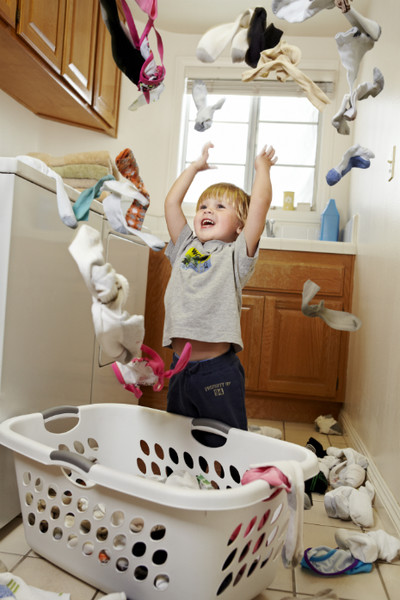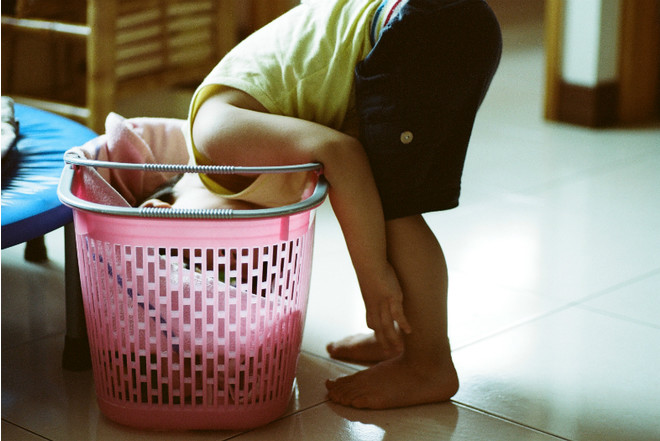- Sun, clean, please toys ... Son,remove the toys ... I told someone to remove? Half an hour has passed, and everything is still lying around! Familiar? No? And if instead of toys substitute any tedious thing? Covering the bed, doing homework, self-dressing, brushing your teeth ... Yeah, now familiar? A photo: GettyImages Surely any parent has experienced similar manifestations of “unwillingness”. And if it would still be possible to give up on cleaning, they say, it will grow - it will learn, and unlearned lessons are fraught with a maximum of two, then with dirty teeth you will not leave a scion? Or with unwashed hands after a walk. Therefore, we must look for a way to accustom the child to tedious, everyday, but important things. The sooner the better. How? This was told to us by the neurologist-psychiatrist Oksana Merkulova.
A photo: GettyImages Surely any parent has experienced similar manifestations of “unwillingness”. And if it would still be possible to give up on cleaning, they say, it will grow - it will learn, and unlearned lessons are fraught with a maximum of two, then with dirty teeth you will not leave a scion? Or with unwashed hands after a walk. Therefore, we must look for a way to accustom the child to tedious, everyday, but important things. The sooner the better. How? This was told to us by the neurologist-psychiatrist Oksana Merkulova.
M - motivation
So, let's take a big sheet of paper and makecalendar of important things to do. We write the days of the week horizontally. Vertically – the actual things that need to be done. For small children – two to three years old – there should be no more than three things to do at a time, for older children you can write down five to six things. You get a “Need” table. “It can be anything you consider important,” explains Oksana. “This way you can teach a baby to use a potty, to go to a nursery without tears, to sleep in his own crib. Older children – to help their parents around the house, do exercises, read. Schoolchildren – to study independently. Then we start filling out this table. If you have completed a task, you draw a sun in the corresponding column, if you have not completed it – a cloud. Or a happy/sad smiley. Or plus/minus. Whatever you like best. “This method is based exclusively on positive motivation,” warns Oksana Merkulova. — Therefore, you can’t “select”, that is, cross out the smileys that have already been given out. By the way, for those who are no longer confident in their own punctuality and can forget to make a calendar for the day, you can find ready-made motivation boards like these on the Internet. You’ll have to spend a little, of course, but such a nice device will create an aura of significance around the table.
P - encouragement
 Photo:GettyImagesIn the evening before going to bed, it is essential to discuss the past day, understand what worked and what did not. Find out the reasons for failure. We sum up the results of the week on Sunday. We agree on a reward system in advance. For example, you had three tasks in the table. Only one was fully completed - some small reward. All three were completed - something more interesting. - A situation may arise when a child, seeing that something is not working out in the middle of the week, can take a stand and say: “Well, since it didn’t work out here, then there is no reward anyway. Why try then,” says Merkulova. - We get out of this situation like this. We explain that the task will be considered completed if there are more positive results. For example, on Wednesday and Thursday the child did not make the bed, but on the other days he managed to do it. So the task is counted. A reasonable question: are we overpraising the child with rewards? The specialist is sure that it is not. - Gradually increase the motivational period, - explains Merkulova. - To receive a reward, the assigned tasks will need to be completed over the course of two weeks, three weeks, and so on. If we are talking about something global, fundamental and important, and the motivation must be strong. What kind of motivation this will be, is up to you to decide, because who, if not you, knows your child better than others. But it is not recommended to reward children with money. As well as with objects. - In my opinion, motivating children of any age with money is wrong. In addition, I do not think that preschoolers should be motivated by purchases, so that the position of "made - received" does not become entrenched. It is better to offer them something emotionally interesting: a trip to the cinema, the circus, the zoo. Or extra time to watch cartoons, games. It all depends on interests. Essence
Photo:GettyImagesIn the evening before going to bed, it is essential to discuss the past day, understand what worked and what did not. Find out the reasons for failure. We sum up the results of the week on Sunday. We agree on a reward system in advance. For example, you had three tasks in the table. Only one was fully completed - some small reward. All three were completed - something more interesting. - A situation may arise when a child, seeing that something is not working out in the middle of the week, can take a stand and say: “Well, since it didn’t work out here, then there is no reward anyway. Why try then,” says Merkulova. - We get out of this situation like this. We explain that the task will be considered completed if there are more positive results. For example, on Wednesday and Thursday the child did not make the bed, but on the other days he managed to do it. So the task is counted. A reasonable question: are we overpraising the child with rewards? The specialist is sure that it is not. - Gradually increase the motivational period, - explains Merkulova. - To receive a reward, the assigned tasks will need to be completed over the course of two weeks, three weeks, and so on. If we are talking about something global, fundamental and important, and the motivation must be strong. What kind of motivation this will be, is up to you to decide, because who, if not you, knows your child better than others. But it is not recommended to reward children with money. As well as with objects. - In my opinion, motivating children of any age with money is wrong. In addition, I do not think that preschoolers should be motivated by purchases, so that the position of "made - received" does not become entrenched. It is better to offer them something emotionally interesting: a trip to the cinema, the circus, the zoo. Or extra time to watch cartoons, games. It all depends on interests. Essence









